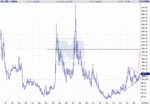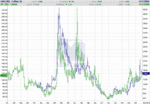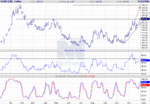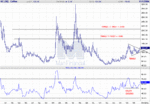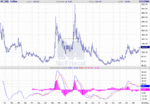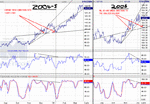Brazilian drought leaves coffee crop high and dry
Growers say output will drop to a four-year low
http://www.chron.com/disp/story.mpl/business/4365916.html
By CARLOS CAMINADA
Bloomberg News
TOOLS
Email Get section feed
Print Subscribe NOW
Brazilian coffee grower Joaquim Jose de Oliveira won't be bringing his full harvest to market this year. Drought that has weakened next season's crop is forcing him to husband this season's.
"I'm only selling enough to keep going," Oliveira said. "Otherwise, next year I'll have almost nothing to sell."
October rains came too late for trees in the prime coffee-growing region to recover from the driest winter in two decades. Few plants have flowered properly, meaning next season's harvest will be meager.
Forecasters say output in the world's largest coffee-producing nation will fall to a four-year low. That has pushed up futures prices by 10 percent in the past month to $1.2265 a pound on the New York Board of Trade. Prices may rise to as much as $1.35 a pound in coming months as farmers like Oliveira hold back supplies, coffee trader John Wolthers said.
"Producers are disciplined these days," said Wolthers, who works at Santos-based coffee exporter Comexim, which buys high-quality Arabica beans. "They've learned to manage the pace of sales pretty well."
Wolthers buys most of his coffee from the southeastern state of Minas Gerais, where communities such as Guaxupe produce some of the country's finest beans.
Oliveira said that because of the drought, only 1,200 of the 23,000 trees flowered properly on a plantation he farms with his three brothers near the town of Guaxupe.
"Without proper flowering, there's little room for optimism over the crop to be harvested in 2007," Nelson Batista Martin, head of research at the São Paulo-based Institute for Agricultural Economics, said in a Nov. 16 report. The institute said Brazil's next April-to-October harvest may shrink to 30 million bags, each containing 132 pounds, from 41.6 million bags this year.
A two-year cycle
Brazil's coffee production normally has a two-year cycle that consists of a larger crop, such as the one just harvested, followed by one of about 20 percent less. A decline to 30 million bags would represent a 28 percent drop.
Mild-tasting Arabica beans account for about 70 percent of Brazil's output. The rest comes from Robusta beans, which are more bitter and used to blend with Arabicas or to produce soluble, or instant, coffee.
About half the Arabica trees in Brazil failed to flower properly because of the dry spell, said Margarete Boteon, head of coffee research at the University of São Paulo, who is based in Piracicaba in southeastern São Paulo state.
The extent of flowering determines the potential of the ensuing harvest. After pollination, the trees develop fruit buds, which turn into bright-red cherries that contain two beans.
Guaxupe, which has the world's biggest coffee cooperative, is nestled amidst the hills that border the states of São Paulo and Minas Gerais, which produce 80 percent of Brazil's Arabica beans.
A 40% decline
The 10,000 members of the Guaxupe Regional Coffee Cooperative, known as Cooxupe, produced about 4.2 million bags this year, equivalent to 13 percent of Brazil's overall Arabica output. Next year, Cooxupe's production will fall 40 percent to about 2.5 million bags, said Joaquim de Andrade, the cooperative's chief agronomist.
Global warming may lead to recurrent droughts, reducing world supplies of Arabica, said Jose Francisco Pereira, general director at Fazenda Monte Alegre, Brazil's third-largest coffee farm. That would lead roasters to increase Robusta coffee, which is more resistant to heat and drought, in their blends, Pereira said. The biggest producer of Robusta coffee is Vietnam, followed by Brazil and Indonesia.
Pereira forecasts production at Monte Alegre will fall 38 percent to 58,900 bags next year.
Seeking confirmation
Mario Cerutti, director of purchasing at Lavazza, Italy's biggest coffee roaster, said there is still time for late berries to emerge next season.
Turin-based Lavazza may send analysts to Brazil to assess the crop. Without confirmation of a sharp drop in output, New York coffee futures will hover between 95 cents and $1.20 per pound in coming months, Cerutti said.

